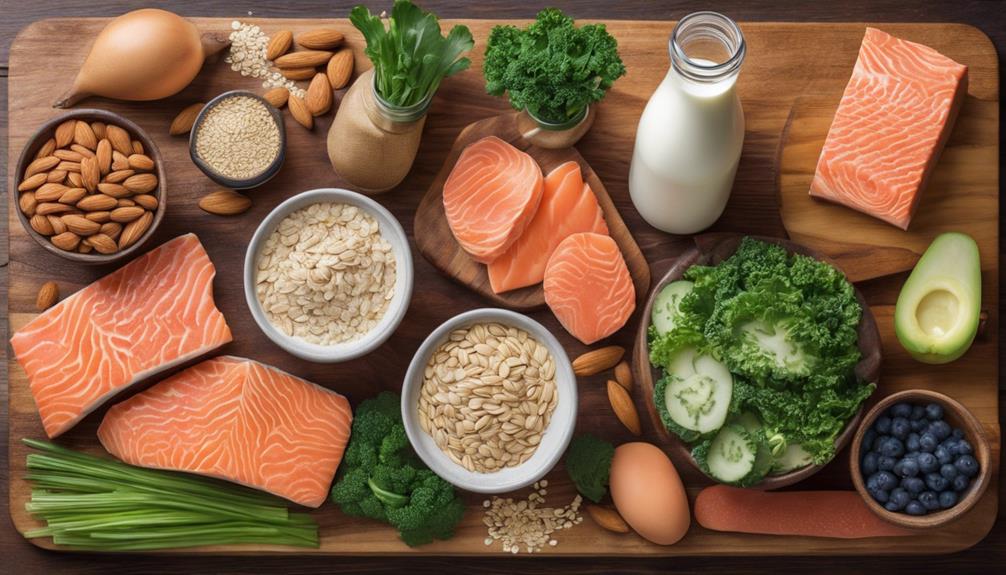As breastfeeding moms, nourishing our bodies is like fueling a well-oiled machine; it's vital for the health of both ourselves and our little ones.
But what exactly should we be putting on our plates to make sure we're meeting our nutritional needs while breastfeeding?
Let's explore some key diet tips that can make a significant difference in how we feel and how well our bodies can support lactation.
Key Takeaways
- Consume an extra 330-400 calories daily for optimal milk production.
- Focus on nutrient-dense foods like whole grains, lean proteins, fruits, and vegetables.
- Stay hydrated with at least 8 cups of water daily for postpartum recovery.
- Incorporate foods like oatmeal, leafy greens, and omega-3 sources to support milk supply.
Caloric Needs for Breastfeeding Moms
Breastfeeding moms typically require an additional 330 to 400 calories daily to support excellent milk production. These caloric needs can fluctuate depending on factors like the baby's age, weight, and how often they breastfeed. Listening to your body's cues and adjusting your calorie intake accordingly is vital. The body naturally expends 300 to 500 extra calories a day during lactation to meet the demands of breastfeeding. Making sure a healthy and balanced diet not only aids in maintaining adequate nutrient stores but also supports overall well-being during this important period.
To meet these additional calorie requirements, focus on nutrient-dense foods that provide essential vitamins and minerals. Incorporating a variety of whole grains, lean proteins, fruits, and vegetables into your meals can help maintain a healthy diet while breastfeeding. By nourishing your body with the right foods, you support both your own health and the quality of the milk you provide for your baby. Prioritizing a well-rounded diet ensures that you have the energy and nutrients needed to thrive while caring for your little one.
Essential Nutrients for Lactation

In supporting lactation, it's essential to focus on obtaining key nutrients like calcium, iron, vitamin D, omega-3 fatty acids, and protein to bolster milk production and maternal health. Here are some essential nutrients for lactation:
- Calcium: Important for bone health and muscle function, calcium can be sourced from dairy products like milk, yogurt, and cheese.
- Iron: Prevents anemia and supports oxygen transport in the body, which can be found in lean meats, leafy greens like spinach, and legumes.
- Vitamin D: Aids in calcium absorption, and fatty fish such as salmon, fortified dairy, and exposure to sunlight are good sources.
- Omega-3 Fatty Acids: Support brain development and can be obtained from fatty fish like salmon and mackerel, as well as walnuts and flaxseeds.
Including a variety of nutrient-dense foods like leafy greens, dairy products, fatty fish, lean meats, nuts, and seeds in your diet can help meet your nutrient needs for optimum lactation and maternal health. Remember, consulting with a healthcare provider or a dietitian can provide personalized guidance for your specific needs.
Hydration Importance for Nursing Mothers
Staying well-hydrated is essential for nursing mothers as it supports postpartum recovery and aids in milk production. Adequate fluid intake is vital for the body to produce the necessary milk to nourish your baby. Nursing mothers should aim to drink at least 8 cups of water daily and about 128 ounces of fluids from all sources to maintain hydration levels while breastfeeding. Dehydration can lead to health issues like urinary tract infections (UTIs) and fatigue, which can hinder your ability to care for your baby. Remember to drink water whenever you feel thirsty to help your body stay properly hydrated.
| Importance of Hydration for Nursing Mothers | Facts |
|---|---|
| Supports postpartum recovery | ✔ |
| Aids in milk production | ✔ |
| Prevents dehydration | ✔ |
Maintaining adequate hydration is essential for your overall well-being and for ensuring you can meet the demands of caring for your little one. By keeping up with your fluid intake, you are not only benefiting your own body but also supporting your baby's health and development.
Foods to Boost Milk Supply

Boosting milk supply through dietary choices can be achieved by incorporating specific foods known for their galactagogue properties and nutritional benefits. Here are some key foods that can help increase milk production and provide essential nutrients for both you and your baby:
- Oatmeal, Barley, and Flaxseeds: These grains and seeds are rich in galactagogue properties, promoting lactation.
- Green Leafy Vegetables: Spinach and kale are excellent sources of essential nutrients necessary for milk production.
- Omega-3 Fatty Acids**: Foods like salmon, chia seeds, and walnuts support brain development in nursing infants.
- Fenugreek Seeds, Fennel, and Brewer's Yeast**: Traditional herbs and spices believed to enhance milk supply and aid in lactation.
Remember to stay hydrated by drinking at least 8-10 cups of water daily. By incorporating these foods into your diet, you can support your milk production while ensuring you and your baby receive the necessary nutrients for best health and development.
Foods to Avoid While Breastfeeding
To promote the health and well-being of both you and your baby, it's advisable to steer clear of certain foods while breastfeeding.
It's important to avoid alcohol entirely while breastfeeding, as even small amounts can be unsafe for your baby. Additionally, limit your caffeine intake to 2-3 cups per day to prevent potential agitation in your little one.
Be cautious of seafood high in mercury, such as shark or swordfish, as it can pose risks to your baby's developing nervous system. Watch out for foods that may cause gas or discomfort in your baby, like certain vegetables or legumes.
Stay away from processed foods and opt for whole, nutrient-dense options to ensure optimal health while breastfeeding. By being mindful of what you eat and making smart choices, you can help support your baby's growth and development while maintaining your own well-being.
Frequently Asked Questions
What Is the Best Diet for Breastfeeding Mothers?
For breastfeeding moms, the best diet includes nutrient-rich foods like lean proteins, whole grains, fruits, and veggies. Importance is essential, so drink at least 8 cups of water daily. Consider a multivitamin and limit caffeine and alcohol intake.
What Is the Recommended Diet While Breastfeeding?
When breastfeeding, we focus on nutrient-rich foods like whole grains, fruits, and lean protein. Hydration is essential. Consulting a healthcare provider for personalized guidance guarantees we meet our unique dietary needs and support best health for mom and baby.
What Is Important in the Diet of Breastfeed Mothers?
Ensuring adequate calorie intake and focusing on nutrient-rich foods are pivotal for breastfeeding moms. Hydration is key, aiming for at least 8 cups of fluids daily. Stay mindful of potential allergens in your diet for your baby's well-being.
What Foods Should Breastfeeding Moms Avoid?
We should avoid caffeine, alcohol, high-mercury fish, processed foods, and common allergens while breastfeeding. These can impact the baby's well-being through agitation, unsafe substances, nervous system effects, milk quality, and potential sensitivities or allergies.
Conclusion
Just like a well-tended garden yields bountiful harvests, nourishing our bodies with the right foods can support a thriving breastfeeding journey.
By sowing the seeds of nutrient-rich foods, staying hydrated like a wellspring, and avoiding harmful weeds, we can cultivate a healthy environment for both mother and baby.
Remember, just as a gardener tends to their plants with care, so too should we nurture ourselves with love and intention during this precious time.
Happy breastfeeding!









